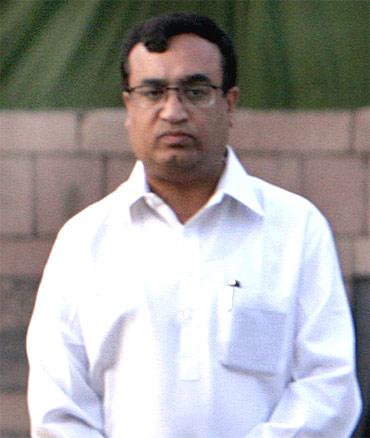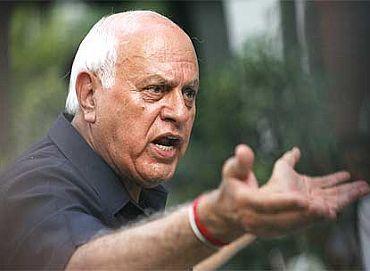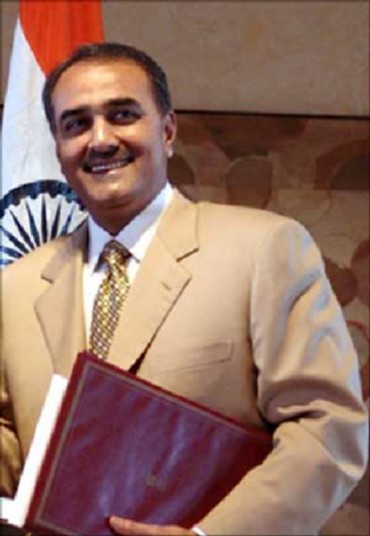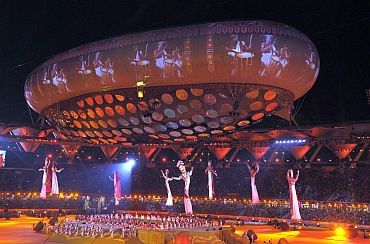 | « Back to article | Print this article |
Why Maken was asked to rework the Sports Bill
Powerful union ministers ganged up to scuttle the draft Sports Development Bill 2011, which sought to increase transparency in all sporting bodies and federations. The Bill could not be passed in the just-concluded cabinet meeting. Renu Mittal explains why
Sports Minister Ajay Maken was hopeful that the cabinet would clear the bill and that it could be passed in Parliament's monsoon session. Sources say that Maken has been asked to revise the bill.
Sources in the cabinet say that three of the five affected cabinet ministers vehemently opposed the bill with Union minister for Road Transport and Highways C P Joshi making the loudest protest, followed by Minister of Heavy Industries and Public Enterprises Praful Patel and Minister for New and Renewable Energy Farooq Abdullah.
While Union Science and Technology Minister Vilasrao Deshmukh did not say a word, International Cricket Council President Sharad Pawar was guarded and sophisticated in his opposition. He said there should be a more holistic approach to the bill and suggested that a Group of Ministers should be set up to take a fresh look at the bill and to redraft it.
Click NEXT to read furtherNo age restriction please
The prime minister, however, did not accept the suggestion to set up a GoM on the bill, and asked Maken to revise the bill and present it later to the cabinet.
Sources said that Joshi gave England's example and said that they depended on self regulation.
The point made by him and other ministers such as Patel was that the over-arching regulations in the proposed Bill would hit the autonomy of the sporting bodies and federations, which would translate into interference and regulation by the Central government in these bodies.
It was felt that the sporting federations would then need to seek the approval of the Central government on all vital aspects of its functioning, and this would lead to the surrendering of their autonomous functioning.
Abdullah was vocal and critical against the provision that heads and members of sporting bodies would retire at 70 years of age. They can only hold two terms, and not beyond that.
It was felt that 70 years was not acceptable, as there are no limits to what age any member of Parliament or member of legislative assembly can contest or become a minister. It was also felt that MPs and MLAs can contest for any number of terms, so why should sporting bodies have tenure limitations.
Click NEXT to read further
The BCCI would be accountable if the Bill is passed
Sporting bodies have had political leaders heading them for decades, such as Bharatiya Janata Party's Vijay Kumar Malhotra in Archery, earlier Priya Ranjan Dasmunshi, and now Patel heading the Football Federation, the 80-plus Vidya Stokes heading the Hockey Federation and so on.
With such a huge amount of vested interest, sources say it would have been a miracle if the Bill could have been cleared by the cabinet.
The Board Of Control For Cricket In India is said to have put its entire might in scuttling the Bill, because if it is passed, the BCCI would then have to be registered with the Sports Ministry as a body.
In that case, it would be accountable, and would have to respond under Right to Information, which it is not doing now since it does not depend on government funding. If the Bill is passed, it would also have to come under the tax bracket and would be open to public scrutiny.
The ministers felt that the Bill would impinge upon the autonomy of sports bodies, and had put too many restrictions on them, said a source.
The Bill's main point, however, lay in its attempt to increase the financial accountability of India's cricket board, one of the richest sports organisations in the world. To do that, the RTI Act would apply to the BCCI.
In addition to its firm stand on the BCCI, the Bill would have made administrators of all sports bodies to be 70 or younger; nobody would have been allowed more than two consecutive terms; and an administrator cannot hold more than two positions simultaneously.
Click NEXT to read further
Sporting bodies need to be better scrutinised
The Bill had also provided for the Indian cricket team to be put through dope tests by the National Anti-Doping Agency, just like any other athlete or sportsperson. The Indian cricketers have not signed the World Anti-Doping Association code and hence do not take dope tests at the national level as well.
"We need reforms in sports, which we hope the National Sports Bill will bring. Our idea was to introduce the Bill in the Monsoon Session," said Maken.
India has close to 40 sports federations such as the Athletic Federation of India and All India Football Federation, as well as the Indian Olympic Association and the BCCI.
While the BCCI is an autonomous body, the IOA is the body responsible for selecting athletes to represent India at the Olympic Games, Asian Games and other international athletic meets and for managing the Indian teams at the events.
The BCCI has objected in the past to regulation on the grounds, that it is not funded by the government. However, various aspects of the T-20 domestic Indian Premiere League tournament, organised by the BCCI, are being investigated for violations of foreign exchange laws and for tax evasion.
A Parliamentary committee also said in its report earlier this month that the Income Tax Department was being very lenient to the BCCI and has allowed the cricketing body to 'enrich its coffers at the expense of the exchequer'.
Ever since the Commonwealth Games were hit by one scam after the other, there has been a demand that sporting bodies need to be better scrutinised and accountable, and that their funds be handled transparently.
Sources said with so many vested interests behind the sporting bodies, it would be surprising if there had been no protests.



